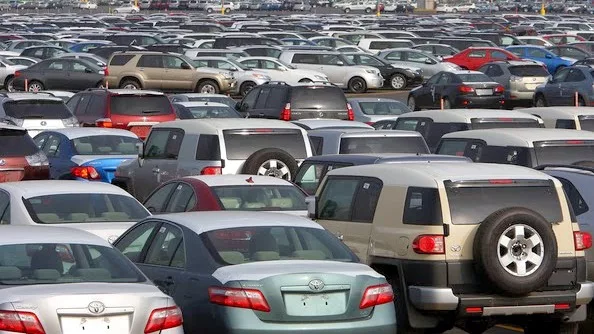In Nigeria’s bustling urban centers and sprawling towns, the heartbeat of life syncs with the rhythm of wheels on pavement, as cars—both old and new—navigate the bustling streets. NATIONAL ECONOMY investigation showed that the recent developments have disrupted this rhythm as vehicle clearance costs surge by a staggering 235 per cent in eight months, plunging importers into a whirlwind of financial uncertainty.
The repercussions of this unprecedented surge reverberate across the automotive landscape, with vehicle importation plummeting by a stark 50 per cent. This downturn in activity has cast a shadow over the nation’s sea ports, where the rising cost of import duty fees has triggered a drastic decline in shipping operations.
NATIONAL ECONOMY gathered that at the root of this problem lies in the Nigeria Customs Service’s adoption of the Central Bank of Nigeria’s floating exchange rate regime.
Since June 24, 2023, import duties have surged from N422.30/$ to a staggering N1,417.635/$ as of February 9, 2024 marking a staggering 235 per cent increase.
As a result, Nigerian importers, faced with soaring clearance expenses, are increasingly abandoning their consignments.
At the Tin-Can Island Ports Complex in Apapa, Lagos, several foreign-used vehicles left stranded at vehicle terminals paint a grim picture of the industry’s plight.
Clearing agents, grappling with the repercussions, cite astronomical figures for vehicle clearance, with costs for a 2022 Lexus RX 350 model reaching an eye-watering N20 million.
Public relations officer at PTML command of the Association of Nigerian Licensed Customs Agents (ANLCA), Ayo Sulaiman,confirmed the distressing trend, noting the staggering increase in vehicle clearance costs since June 2023, severely impacting importers’ financial forecasts.
“The abandonment resulted from an increased exchange rate for Customs clearance by the Central Bank of Nigeria,” Sulaiman stated, shedding light on the factors driving importers to reconsider their shipping decisions.
The consequences of this upheaval extend far beyond the automotive sector, with the National Bureau of Statistics (NBS) reporting a significant 51.2 per cent drop in the value of used cars imported by Nigerians.
The result of this decline extend beyond individual consumers to broader economic implications.
According to a car dealer, Bayo Johnson, the automotive industry, a key driver of Nigeria’s economy, stands to suffer significant losses as demand for used cars wanes and dealerships struggle to stay afloat.
He further said suppliers, mechanics, and other stakeholders should be bracing for the impact, with job losses and business closures becoming increasingly likely.
“Moreover, the decline in the importation of used cars threatens to exacerbate existing challenges in Nigeria’s automotive sector, including a lack of investment in domestic manufacturing, inadequate infrastructure, and a reliance on imported goods and services.
“Without a concerted effort to address these underlying issues, the country risks falling further behind in its efforts to build a resilient and sustainable transportation system that meets the needs of its growing population,” he said.
In the face of these challenges, stakeholders are calling for urgent action to mitigate the effects of the decline in the importation of used cars and chart a path forward for the automotive industry.
Commenting, an economic affairs analyst, Dr. Paul Nnaji, said, “Policymakers must prioritise measures to support local manufacturing, encourage investment in alternative transportation solutions, and address the root causes of Nigeria’s dependence on imported vehicles.”
At the same time, industry leaders and advocates are urging a collaborative approach to find sustainable solutions that balance the need for affordable transportation with the imperatives of economic development and environmental sustainability.
Nnaji noted, “By working together to promote innovation, investment, and regulatory reform, stakeholders can lay the foundation for a more resilient and inclusive automotive sector that benefits all Nigerians.”
For consumers, the implications of the tariff hike are profound. Already grappling with economic challenges such as high unemployment rates and inflationary pressures, Nigerian families now face the prospect of being priced out of the automotive market altogether.
For those who rely on cars for their livelihoods—such as taxi drivers, delivery workers, and small business owners—the tariff increase poses a direct threat to their ability to earn a living, with far-reaching consequences for economic stability and social mobility. The prices of new vehicles are prohibitive for the average Nigerian.
Livinus Asoziwe at Cashlinks, stated that policymakers must explore measures to support alternative transportation solutions, such as public transit and ride-sharing initiatives, to alleviate the strain on consumers and reduce dependence on imported vehicles.
He stressed that policymakers must prioritise measures to support local manufacturing, encourage investment in alternative transportation solutions, and alleviate the financial burden on consumers through targeted subsidies and incentives.
At the same time, industry leaders and advocates are urging a collaborative approach to finding sustainable solutions that balance the need for economic development with the imperative of affordability and accessibility.
A development economist at Saturn Associates, Dan Igbrude, stated that by working together to address the root causes of Nigeria’s reliance on used imported vehicles and promote domestic innovation and production, stakeholders can lay the foundation for a more resilient and inclusive automotive sector that serves the needs of all citizens.





